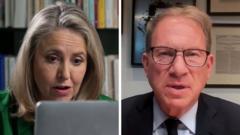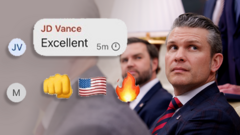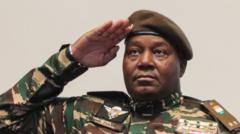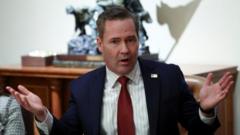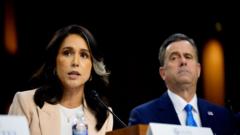In a dramatic episode that has gripped Washington, Jeffrey Goldberg, editor of The Atlantic, found himself at the eye of a political storm after unwittingly joining a Signal chat containing sensitive discussions among top U.S. officials, including national security matters. The fallout intensified after Goldberg's reporting drew scathing attacks from President Trump and National Security Advisor Michael Waltz, who accused him of fabricating claims regarding classified information shared in the chat.
### "Journalist Caught in Signal Chat Storm: Goldberg Faces Trump's Wrath After Sensitive Leak"
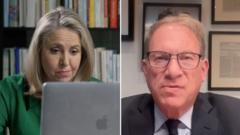
### "Journalist Caught in Signal Chat Storm: Goldberg Faces Trump's Wrath After Sensitive Leak"
The fallout from a leaked Signal chat involving U.S. officials raises questions about national security practices and accountability.
Goldberg initially received a curious message from Waltz via the encrypted messaging app, leading him to believe it was a hoax. However, he quickly realized he was part of a conversation involving high-ranking officials such as Secretary of State Marco Rubio and CIA director John Ratcliffe, discussing the timing and specifics of a military operation in Yemen. Despite Waltz claiming to have mistakenly added Goldberg to the chat, Goldberg pointed out the irony of the situation, citing the need for accountability among those handling sensitive information.
As the controversy unfolded, the White House downplayed the significance of the shared information, with officials like Pete Hegseth denying any wrongdoing. Nevertheless, Goldberg defended his role as a journalist, stating that the details shared in the chat, which included exact timings of military strikes, constituted sensitive, operational information.
The incident has reignited debates around the use of encrypted messaging apps by government officials and raised concerns about differing standards for accountability within the Trump administration. As Goldberg reflected on the personal attacks aimed at him, he emphasized that this tactic—an aggressive offense rather than a defense—was a familiar strategy among those in power.
With calls for investigations echoing in political circles, the repercussions of the incident remain to be seen, underscoring the importance of ethical practices and the handling of sensitive communications in modern governance.
As the controversy unfolded, the White House downplayed the significance of the shared information, with officials like Pete Hegseth denying any wrongdoing. Nevertheless, Goldberg defended his role as a journalist, stating that the details shared in the chat, which included exact timings of military strikes, constituted sensitive, operational information.
The incident has reignited debates around the use of encrypted messaging apps by government officials and raised concerns about differing standards for accountability within the Trump administration. As Goldberg reflected on the personal attacks aimed at him, he emphasized that this tactic—an aggressive offense rather than a defense—was a familiar strategy among those in power.
With calls for investigations echoing in political circles, the repercussions of the incident remain to be seen, underscoring the importance of ethical practices and the handling of sensitive communications in modern governance.








